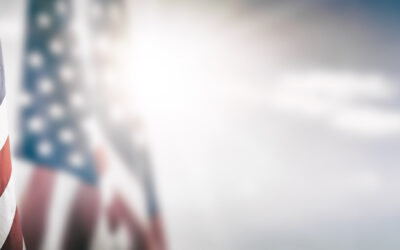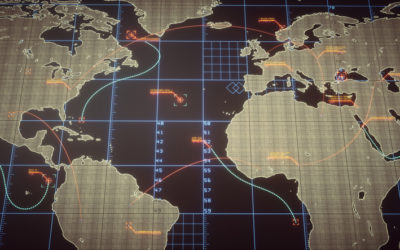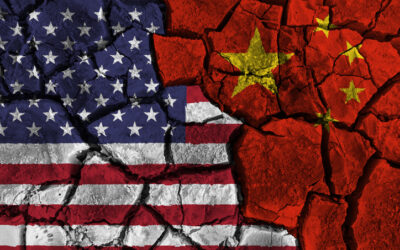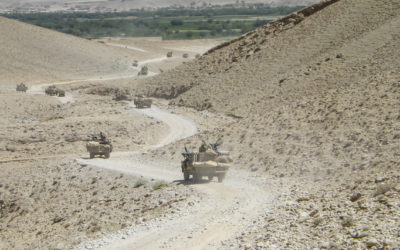
A Look at the U.S. Army’s Future Mission
Thousands of people are virtually gathering this week as the Association of the United States Army (AUSA) kicks off its annual conference focused on the […] More
Known to many as the ultimate rejector of the basketball, NBA legend Dikembe Mutombo has also taken many under his humanitarian wing. Mutombo has used his famous finger-wag to become the first and only NBA Global Ambassador, a Board Member of the Special Olympics, and head the Dikembe Mutombo Foundation, which dedicates itself to improving the health, education and quality of life for the people of the Democratic Republic of the Congo. The Hall of Famer has dedicated his life to international humanitarian efforts, and discussed with The Cipher Brief his aspirations to do more to help those in need around the world.
The Cipher Brief: When you came to Georgetown you wanted to be a doctor. What influenced your decision to focus more on international affairs? In what way has the NBA provided you with the platform and network to be successful in your humanitarian endeavors?
Dikembe Mutombo: When I arrived at Georgetown, it was my intention to study medicine and to one day become a doctor and return home to the Congo. However, when I was asked to join the university’s basketball team, I re-directed my studies to Diplomacy and Linguistics, which ignited my interest in international affairs. The NBA has supported my humanitarian work from the time I first entered the League, because the NBA continues to be involved with numerous global humanitarian causes. As far back as 1993, I visited Somali refugee camps in Northern Kenya with the former NBA Commissioner, David Stern. My Georgetown colleagues, Patrick Ewing and Alonzo Mourning, have also traveled with me to South Africa (Cape Town and Johannesburg).
The NBA Global Games are a series of games featuring NBA teams that are played outside the United States and Canada. The purpose of the Global Games is to bring teams from the NBA to play against either another NBA team or a foreign club. When I am invited to attend these games, the interviews I do surrounding the event gives me a platform to share my humanitarian work with people in that particular country. Believe it or not, people around the world are quite interested in my story, and I am happy to share it with them. Social media also keeps them informed.
TCB: What has your role been as the NBA’s first and only global ambassador?
DM: I was appointed to this position back in 2009. My specific role has been to grow and celebrate the game of basketball through international events, while also working with ‘NBA Cares’ to bring attention to important social issues. ‘NBA Cares’ works with internationally recognized, youth-serving programs that support education, youth and family development, and health-related causes, which includes: the Special Olympics, YMCA of the USA, Boys and Girls Clubs of America, UNICEF, the Make-A-Wish Foundation, and Share Our Strength. It has been exciting to work with these programs because they really make a difference around the world. Since October 2005, when ‘NBA Cares’ was launched, we have raised more than $270 million for charity, provided more than 3.5 million hours of hands-on service, and built more than 995 places where kids and families can live, learn or play, in communities around the world.
TCB: How have you used sports, such as your work with the Special Olympics team from the Democratic Republic of Congo and your recent trip to Cuba with the NBA, to impact larger global issues outside of sports?
DM: Bringing a Special Olympics team from the Congo helped shine a light on those with intellectual disabilities in my homeland. At first it was challenging to even locate the school where the children were because, unfortunately, like so many societies, young people with special needs are often hidden away or abandoned. After the delegation returned to the Congo with their gold, silver, and bronze medals, they were publicly recognized for their achievements by the Cardinal of the Catholic Church in the Congo. This was huge for the Congo and most importantly for those children and young adults with special needs.
Travelling to Cuba was great, and I never imagined that I would go there—much less conduct a four day basketball camp in the city of Havana. Our job is to expand the game globally. It was a historic trip, and one that I will never forget. Although many of the young Cuban players did not have shoes when they showed up for the camps, the NBA brought dozens of pairs of new basketball shoes for them, and you should have seen the looks on their faces! I believe that basketball is a sport that can connect people. It gives them a bridge for cultural and social change. The language of sports is universal, so it did not matter whether I spoke Spanish or not—the sport has its own language of unity.
TCB: Why did you feel it was important to start the Democratic Republic of the Congo’s first Special Olympics team, and why was the opportunity to compete on the global stage particularly meaningful to the people of the DRC?
DM: I serve on the Board for Special Olympics International, and I have also served as one of their Global Ambassadors. After traveling to several countries with the Special Olympics organization, promoting the games for people with intellectual disabilities, it bothered me that my homeland did not have representation in the Special Olympics games. I brought this to the attention of my Foundation, who applied for and received a grant from Google, allowing us to bring a delegation from the Congo to the World Games in Los Angeles. It was not easy, but it was important for me to see athletes with intellectual disabilities from my homeland have a chance to compete in the Special Olympics. I was so proud when they won the gold, silver, and bronze and also proud to walk with the delegation at the Opening Ceremony at the Los Angeles Memorial Coliseum.
TCB: Why is global collaboration so critical for public health improvements?
DM: Global collaboration is critical for public health improvements, now more than ever. We have witnessed this firsthand in regards to the Ebola outbreak two years ago. When you collaborate on a global level and share health information, you can better know what the signs are to catch illnesses early.
I was invited to serve on the CDC Foundation board because I travel the world, and I have seen the devastation that disease and epidemics have imposed on poverty-stricken populations. The CDC Foundation helps the U.S. Centers for Disease Control and Prevention to do more, faster, by forging public-private partnerships to support CDC’s 24/7 work to save lives and protect people from health and safety threats. Almost no one in the United States worries about polio, but until as late as a year ago, it was still a problem in my country.
TCB: What did it mean to you when President George W. Bush called you the Son of the Congo? How has this inspired your efforts with your foundation?
DM: When President Bush said that during the State of the Union address, I had the biggest smile on my face, because I am proud to be called, Son of Congo. It is national pride, and it propels me each day to explore ways to help the people in my homeland and to improve their daily lives because I have a good life, and I know that it can happen. The Congo is where I was born, and it was where I was raised. I have an obligation to my homeland just like a son has an obligation to aging or sick parents – I must help. I wake up thinking about new ways to help, and I go to sleep wondering what more can I do.
Related Articles

Thousands of people are virtually gathering this week as the Association of the United States Army (AUSA) kicks off its annual conference focused on the […] More

Eric Shiraev, Political Psychologist, George Mason University “The Cipher Brief has become the most popular outlet for former intelligence officers; no media outlet is even […] More

CIPHER BRIEF EXPERT VIEW — Mark Kelton is a retired senior Central Intelligence Agency executive who retired in 2015 with 34 years of experience in intelligence […] More

Innovation is a key component of readiness when it comes to future threats. NATO’s Innovation Hub recently commissioned a short story from author August Cole, […] More

Tim Willasey-Wilsey is a former senior British diplomat and now a Senior Visiting Fellow at King’s College London’s Department of War Studies. The probability is […] More

The current Administration’s top leadership on defense, diplomacy and intelligence – the Secretary of Defense, Secretary of State, and Director of National Intelligence – all […] More
Search